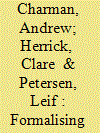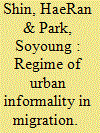|
|
|
Sort Order |
|
|
|
Items / Page
|
|
|
|
|
|
|
| Srl | Item |
| 1 |
ID:
141070


|
|
|
|
|
| Summary/Abstract |
In early 2012, South Africa's Western Cape Province enacted new alcohol control legislation amid mounting concern with the costs of alcohol-related harms. This has focused on urban shebeen closure to control the informal, unlicensed trade and the harms it generates through crime, violence and injury. In contrast to policy discourse, this paper contends that rather than existing outside regulation, the city's shebeeners embrace multiple (self and collective) regulatory strategies to manage the inherent risks of their own informality. Drawing on novel empirical data including a ‘business census’ and interviews with the police and liquor traders across four Cape Town case study sites, the paper adds new depth to contemporary engagements with the appropriate and equitable regulation of the South African informal liquor trade.
|
|
|
|
|
|
|
|
|
|
|
|
|
|
|
|
| 2 |
ID:
126050


|
|
|
|
|
| Publication |
2013.
|
| Summary/Abstract |
This paper discusses how urban informality in the developing world has been understood in the West, and how it has been incorporated in the discourse of urban architects and planners in the developed world. It proposes a genealogy of this understanding through the identification of discourses with major ideological currents. It explains the evolution of the relationship between the understanding of urban informality and anarchism; the empowerment of the urban poor and finally the role of this understanding as a neoliberal discourse against state intervention. It finds that, although the incorporation of urban informality in urban architectural discourses is presented as a relative novelty, it is in reality at least 60 years old, dating from John Turner's writings about the barriadas of Lima. From a progressive and empowering understanding of how the grassroots are able to take their lives into their own hands, it has become a tool for neoliberal discourses defending the dismissal of the state as a valid articulator of urban development.
|
|
|
|
|
|
|
|
|
|
|
|
|
|
|
|
| 3 |
ID:
154852


|
|
|
|
|
| Summary/Abstract |
This study looks at how a regime of urban informality has taken shape in a migrant receiving community in Seoul, South Korea. It investigates how actors from the public sector and the private sector came to help undocumented Chosŏnjok migrants stay in the Kuro/Taerim area of Seoul regardless of their legal status. We view such practices as a response to local changes provoked by shifts in the geopolitical environment and fluctuating national policies. Based on longitudinal fieldwork, including in-depth interviews, participant observation, and archival research the findings of this study are as follows. First, public-sector actors, including the Korea immigration service, local authorities, and local police, have shifted their roles from controlling to accommodating, being motivated by competition with other departments, promotion, and personal attachment. Second, the private sector has expanded its role, building on relations with Chosŏnjok as easygoing customers and service providers. This study contributes to the understanding of regimes of informal settlements and their spatial contexts.
|
|
|
|
|
|
|
|
|
|
|
|
|
|
|
|
| 4 |
ID:
178752


|
|
|
|
|
| Summary/Abstract |
Communities with large concentrations of migrants, who often live in makeshift and illegal housing, have been common on the margins of large cities in China since the 1980s. Why do so-called “urban villages” persist and even flourish despite repeated government crackdowns? By addressing this question, this article sheds light on a subtle dynamic of city making that has not been fully appreciated by scholarly literature and media reports that have focused on large-scale demolition and eviction in China’s rapid urbanization. Drawing from my two years of field research in Hua village, a community on Beijing’s fringes in line for land expropriation, I explore how multilateral negotiations between local residents (villagers), migrant tenants, the village committee, and municipal government led to a cyclical movement of temporary housing construction, demolition, and extension. The dynamics of recurring demolishment and reconstruction engendered spaces of suspension, which enabled migrants to enter the urban economy at a low cost. Such spaces, however, offered no formal protection or basis for developing lasting social relations, and always faced the prospect of being demolished, but nevertheless were constantly available and even expanding.
|
|
|
|
|
|
|
|
|
|
|
|
|
|
|
|
| 5 |
ID:
192942


|
|
|
|
|
| Summary/Abstract |
In Vietnam's capital city Hanoi, the growing popularity of application based (app-based) motorbike taxis has offered many inhabitants new opportunities to pursue a mobile livelihood with ride-hailing platforms. Nonetheless, as this influx of app-based drivers has hit the city's streets, specific livelihood and mobility frictions have emerged, notably with informal, ‘traditional’ motorbike taxi drivers, or xe ôm. In this paper we analyse these evolving sites and moments of friction and their impacts on driver livelihoods and mobilities for both driver groups. We draw conceptually on debates regarding mobility, platform economies, and urban livelihoods, while specifically interrogating the concept of friction to highlight three possible analytical applications. Methodologically, we interpret static and ride-along interviews completed with over 130 drivers. We highlight a range of tactics ‘traditional’ and app-based motorbike taxi drivers have employed to respond to rising frictions, defend their ‘turf’, and maintain their street-based livelihoods. Driver responses reveal differing access to distinctive forms of social capital and social networks, and contrasting levels of agency regarding their mobilities. By conceptually teasing apart the notion of friction, we wish to expand and deepen understandings of the experiences of vulnerability, precarity, and other impacts of platformisation for different motorbike taxi driver cohorts.
|
|
|
|
|
|
|
|
|
|
|
|
|
|
|
|
|
|
|
|
|